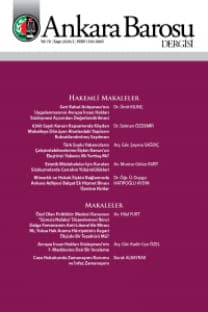Sürekli Borç İlişkilerinde Borçlunun Temerrüdü
Türk Borçlar Kanunu, Sürekli Edim, Temerrüt, Sürekli Borç İlişkisi, Borçlunun Temerrüdü.
DEFAULT OF OBLIGOR IN CONTINUOUS DEBT RELATIONS
Turkish Code of Obligations, Continious Performance, Default, Continuous Debt Relations, Default Of Obligor,
- ISSN: 1300-9885
- Yayın Aralığı: 4
- Başlangıç: 1942
- Yayıncı: Ankara Barosu Başkanlığı
Sürekli Borç İlişkilerinde Borçlunun Temerrüdü
Tarım Sigortalarının Devlet Tarafından Desteklenmesi ve Tarım Sigortaları Havuzu Sistemi
Anayasa Mahkemesi’ne Bireysel Başvuruda Avrupa İnsan Hakları Sözleşmesi’nin Yorumu
Üçüncü Kişinin Kira Sözleşmesinin Kurulmasından Sonra Kiralananda Üstün Hak Sahibi Olması
Çatışan İki Değer: Haber Verme Hakkı ve Kişilik Hakkı
Ticari İşletme Devirlerinin Muvazaa Nedeniyle İptali (İİK.m. 280/III)
İlknur Suidiye ŞEKER, Hilmi ŞEKER, Ertay BORAN
Birleşmiş Milletler 2015 Sonrası Kalkınma Gündemi ve Hukukun Üstünlüğü İlişkisi
